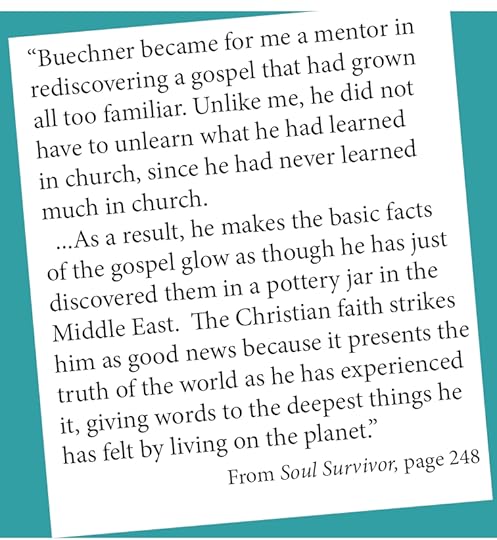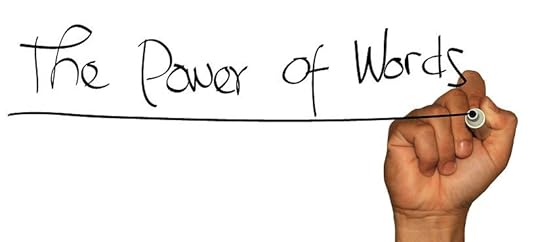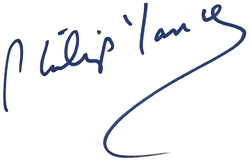Why I Write
 I just returned from a week at the Frederick Buechner Writer’s Workshop in Princeton, New Jersey. Buechner has always been a model for me, an author who expresses the essentials of faith in beautifully crafted prose, creating new forms as he writes. Spending a week with other presenters and prospective writers got me thinking about why I write.
I just returned from a week at the Frederick Buechner Writer’s Workshop in Princeton, New Jersey. Buechner has always been a model for me, an author who expresses the essentials of faith in beautifully crafted prose, creating new forms as he writes. Spending a week with other presenters and prospective writers got me thinking about why I write.
Not long ago I received a letter from Indonesia written in fractured English:
“I been reading your book The Jesus I Never Knew. These truly a blessing. I read them three times. many times i couldn’t sleep at night thinking what you wrote. Your book help me see Jesus not only a person who lived and died on earth 2000 ago, but also a real person that risen 2000 ago that still reacheable until today.”
Whenever I get such a letter, I give thanks for the privilege of working with words and for the unlikely linkages they make possible. I know no more isolated occupation than writing. “We read to know that we’re not alone,” said one of the students tutored by C. S. Lewis in the movie Shadowlands. Yes, and we write in desperate hope that we’re not alone, hoping that the sometimes-tedious tasks of researching, composing, and polishing words will eventually become a virtual chain that links us to others.
 Writing has afforded a way for me to work out my faith, word by word. As a journalist I sought out people I could learn from, people who ultimately pointed me toward the Jesus way (I wrote about some of them, including Frederick Buechner, in Soul Survivor). And to my astonishment God eventually began to use my own words to encourage others in their faith.
Writing has afforded a way for me to work out my faith, word by word. As a journalist I sought out people I could learn from, people who ultimately pointed me toward the Jesus way (I wrote about some of them, including Frederick Buechner, in Soul Survivor). And to my astonishment God eventually began to use my own words to encourage others in their faith.
A woman in Lebanon told me how much my book Disappointment with God meant to her. She read it a few pages a night in the midst of the civil war there, descending thirteen flights of stairs in a darkened stairway to a bomb shelter underground and reading by the light of a kerosene lamp. Another woman in Beirut wrote that my book What’s So Amazing About Grace? helped her have a better attitude toward the P.L.O. guerrillas who had commandeered her apartment. I read such letters and think to myself, I really had in mind a chronic illness not a civil war, and neighbors who play loud music not guerrillas who move in uninvited. Again and again God has surprised me by using words written with mixed motives by my impure self to bear fruit in ways I never could have imagined.
 I have an entire bookcase devoted to copies of my books published in foreign languages. I used to worry about how my words would relate to other cultures. As I travel internationally, though, I realize that we human beings are alike. We face the same basic issues: growing up, sex drives, temptation, romance, ambition, money, children, illness, death. We wonder how a God who created the universe can care about our petty problems, and why God’s intervention on earth seems so unpredictable and sporadic. We wonder about right and wrong, life and afterlife, pleasure and pain. Though they manifest themselves in different ways, at heart the same realities confront us all, no matter the culture we live in, and we writers simply try to tell the truth about those realities.
I have an entire bookcase devoted to copies of my books published in foreign languages. I used to worry about how my words would relate to other cultures. As I travel internationally, though, I realize that we human beings are alike. We face the same basic issues: growing up, sex drives, temptation, romance, ambition, money, children, illness, death. We wonder how a God who created the universe can care about our petty problems, and why God’s intervention on earth seems so unpredictable and sporadic. We wonder about right and wrong, life and afterlife, pleasure and pain. Though they manifest themselves in different ways, at heart the same realities confront us all, no matter the culture we live in, and we writers simply try to tell the truth about those realities.
Words have a way of penetrating barriers. Think, say, of when a Jehovah’s Witness missionary knocks on your door: immediately defenses go up. But printed words are far less threatening. Someone in Indonesia can pick up a book about Jesus and decide to read it, confident that if she finds it unconvincing, she can simply put it down. Words literally saved my faith. When professors and pastors didn’t know answers to crucial questions, I could find them in authors such as C. S. Lewis and G. K. Chesterton—and, of course, Frederick Buechner.
God forbade “graven images,” which can overwhelm and dominate, like an idol. Instead, God approaches us in the most freedom-enhancing way imaginable: through words. John’s Gospel settled on the title the Word for the clearest revelation of God’s own self.
Modern society keeps drifting away from words, relying instead on images and graphics. There’s even an emoji Bible that translates verses into emoticons (http://www.bibleemoji.com/). I won’t make that shift. I’m sticking with words.

The post Why I Write appeared first on Philip Yancey.
 newest »
newest »




It's great to finally be able to reach you. I'm from Ethiopia, and most of your books are not easily available here. However, I managed to get my hands on The Jesus I Never Knew a couple of years ago. I share the sentiment in the Indonesian letter about its impact on my life.
Few weeks ago, I read Disappointment with God and What's So Amazing about Grace. They're just profound! Few days later I'll begin Prayer... You can imagine my excitement! (I plan to read all of your books, but I think these and 2 or 3 others are the ones available in our country :( ), and buying them online is practically impossible. Only the business/political elite possess valid credit/debit cards.
Despite these setbacks I'm hopeful that I'll get to read the remaining works. I also want to write you my reflections. Would you please inbox me your postal address? I couldn't find it on your books so far :)
God bless!